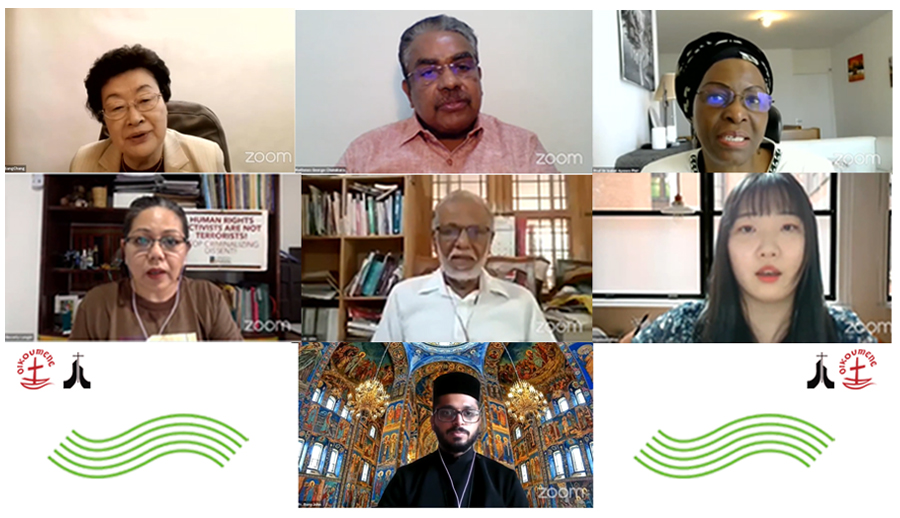WCC–CCA joint Asia Regional Consultation urges churches to deepen accompaniment amidst COVID-19 pandemic
 Resource persons of the Joint WCC-CCA PJP Asia Regional Consultation
Resource persons of the Joint WCC-CCA PJP Asia Regional Consultation
Vaccine inequity that is making containment measures more difficult for people and communities in the context of the COVID-19 pandemic, and increasing trends of gender-based violence, injustices against indigenous peoples, and insecurities among the youths were identified as major issues in Asia during a regional consultation jointly organised by the World Council of Churches (WCC) and the Christian Conference of Asia (CCA).
Organised specifically to bring out the myriad challenges caused due to the surge of the coronavirus, the Consultation held on 4 June 2021 focused on the theme ‘Overcoming Challenges of Inequality in Asia: Pilgrimage of Justice and Peace (PJP) in the context of the COVID-19 Pandemic’.
Introducing the theme, Dr Mathews George Chunakara, the General Secretary of the CCA, who also moderated the session said that the reflections that were being aimed at through the platform would explore the impact of COVID-19 as well as the work of the PJP through its continuing journey since the first surge of COVID-19.
Rev. Dr Sang Chang, the WCC President for Asia, delivered the opening remarks. She said that the ecumenical movement had called on the churches to live out their journey of faith through the PJP, which had taken on added dimensions of complexity in the past eighteen months.
“Churches in Asia must commit with one heart and mind our solidarity for those who are suffering, and move towards more practical ways of living out justice and peace. We must continue to bring hope, faith, and solidarity in fellowship around the world,” said Dr Chang.
Dr Isabel Apawo Phiri, the WCC Deputy General Secretary, shared insights gleaned through similar conversations held in other continents and said, “Inequalities of health and wealth are evident around the world. However, we need to learn from each other, support each other, respond in solidarity in a timely manner with compassion and empathy as one body of Christ to overcome this crisis.”
Dr Jacob T. John, an eminent virologist in India shared the challenges related to vaccine distribution in Asia.
Dr John said that health and healing was an integral component of our faith and duty, and that the aspirational goal of eradicating the ‘nasty visitor’ permanently was feasible and possible with enhanced global cooperation which would ensure real vaccine equity and access, despite the economic status of countries.
“The world has stopped for a while its journey towards the destination of self-destruction. We must question our willingness and momentum of continuing towards this same direction or destination; thus redefining our goals locally, nationally, and globally,” opined Dr John.
Hanbeet Rhee, from South Korea, spoke on the issues of women, girls, and gender-based violence.
Highlighting best practices, she shared some ways in churches and the ecumenical movement in Asia were ‘comforting, encouraging, and empowering women by inviting them into the public sphere’ through support programmes and provision of safe spaces.
Beverly Longid of the International Indigenous Peoples’ Movement for Self-Determination and Liberation elaborated upon how the rights of indigenous peoples and communities were curtailed as lockdown and containment led to lesser provisions for communications among peoples' networks and movements, which resulted in increased militarisation and authoritarianism in Asia.
She provided examples of how different countries had misused the pandemic to consolidate their own absolute power while undermining the rights and dignity of indigenous people and ethnic minorities.
Fr. Rony John, an ordained minister from the Malankara Orthodox Syrian Church in India, provided the youth perspective on the threat to livelihoods, the rise of unemployment, and issues of mental health amidst the grave chaos and disorder caused by the pandemic.
Dr Manoj Kurian from the World Council of Churches shared his views on the direction of moving forward in togetherness said that it was our moral and ethical imperative to support each other, and mobilise together to challenge the existing inequalities in our society.
In his closing remarks, Dr Mathews George Chunakara said, “Although the inequity that persists in many forms is worrying and of great concern, we must continue to preserve our hope and move forward.”
“As the surge of COVID-19 continues to cause serious concern, we are hard-pressed but not distressed, we are perplexed but not destroyed. Let us strengthen our collaborations and accompaniment at every level—among churches and councils, CSOs and FBOs, states and non-state actors—as we move forward towards recovering and rebuilding from the worst effects of the global pandemic,” encapsulated Dr Mathews George Chunakara.
The Pilgrimage of Justice and Peace (PJP) is a church accompaniment programme that was initiated after the WCC’s 2013 Assembly in Busan, Korea. This year’s Asia Regional PJP was held as part of an ongoing series of online consultations and collaborations of the WCC and Regional Ecumenical Organisations (REOs) in Africa, Latin America, North America, the Caribbean, the Pacific, and Europe.
The full proceedings of the Consultation are available on the WCC’s YouTube channel here:
https://www.youtube.com/watch?v=nc7O75mJljk










